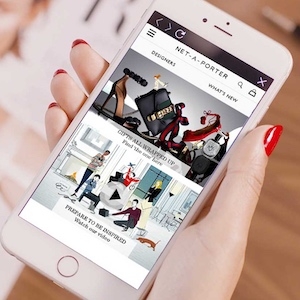
It’s not just jewelry e-tailers that are consolidating. High-end luxury e-tailers are doing it too—and the jewelry and watch business will likely be affected.
Richemont has sold part of its stake in Yoox Net-a-Porter (YNAP) to Farfetch, the online luxury marketplace that went public in 2018.
The deal calls for Farfetch to purchase all of longtime rival YNAP within three to five years, subject to certain conditions.
It also means that nearly all of Richemont’s celebrated brands—including noted watch and jewelry names Cartier, IWC Schaffhausen, Jaeger-LeCoultre, Montblanc, Piaget, Vacheron Constantin, and Van Cleef & Arpels—will have e-concessions on Farfetch.
The overall goal is to create a “neutral industry-wide platform” that will attract a wide variety of luxury brands, a statement said.
In a conference call following the announcement, Farfetch CEO José Neves hoped that Richemont’s decision to use its platform would persuade other jewelry and watch brands to do the same. He commented that watches and jewelry sales represent more than 20% of the global luxury market, but the category accounts for less than 3% of Farfetch’s sales.
“Many of the world’s leading online watch and jewelry brands have avoided online wholesale distribution, and so far, have not even engaged in e-concessions,” Neves said.
“There is strong appetite among consumers for these products, particularly from our private clients. All record sales from our fashion concierge team have been fine watches and jewelry, including the most recent sale of a $2.4 million Richard Mille watch to a private client earlier this year.”
A statement called YNAP and Farfetch’s business models “highly complimentary.” YNAP acts like a traditional luxury retailer with a curated selection. Farfetch is primarily an eBay-style marketplace that lets luxury companies sell direct to consumers using a drop-ship e-concession model.
Neves noted that the two sides have different customer profiles. Farfetch’s customers are primarily under 35, and “digitally native, having grown up with two-sided marketplaces as an integral part of their life. They like the choice…and do not want to be told what to wear.”
Net-a-Porter and companion site Mr. Porter mostly attracts over-35 consumers.
These shoppers “started their luxury shopping habits when the glossy magazine and the department store still formed a symbiotic relationship that organized the world of luxury,” Neves said. “[This customer] maintains a need for guidance and depends on the authoritative voice of an editor, who facilitates their discovery. They require choice, but what they love most is feeling they are being serviced by an excellent curator.”
That customer is more prevalent in the West, he said, where luxury customers tend to be older than in newer markets like China.
The new arrangement calls for Farfetch to own 47.5% of YNAP. Symphony Global—an investment vehicle controlled by United Arab Emirates mogul Mohamed Alabbar—will own 3.2%. Alabbar is YNAP’s longtime partner in the Gulf States, and YNAP will take full control of its business in that region in exchange for the shares.
The current structure means that Yoox Net-a-Porter will have no majority owner. Until Farfetch purchases it, Richemont will maintain a 49.3% stake.
After the deal goes through, YNAP will appoint a new CEO for the site with experience “running multi-brand e-commerce operations,” said Neves. Richemont veteran Geoffroy Lefebvre has headed it since January 2021.
For a long time, analysts have urged Richemont to unload YNAP, which they dubbed a money-loser.
Richemont first bought a majority share in Net-a-Porter in 2010. In 2015, the site merged with Yoox, a Milan-based e-tailer.
In 2018, Richemont purchased the newly combined site for $3.3 billion.
Since then, the site has produced consistent losses; as part of this transaction, Richemont logged a $2.7 billion write-down on its purchase.
Photo courtesy of Yoox Net-a-Porter
- Subscribe to the JCK News Daily
- Subscribe to the JCK Special Report
- Follow JCK on Instagram: @jckmagazine
- Follow JCK on X: @jckmagazine
- Follow JCK on Facebook: @jckmagazine






